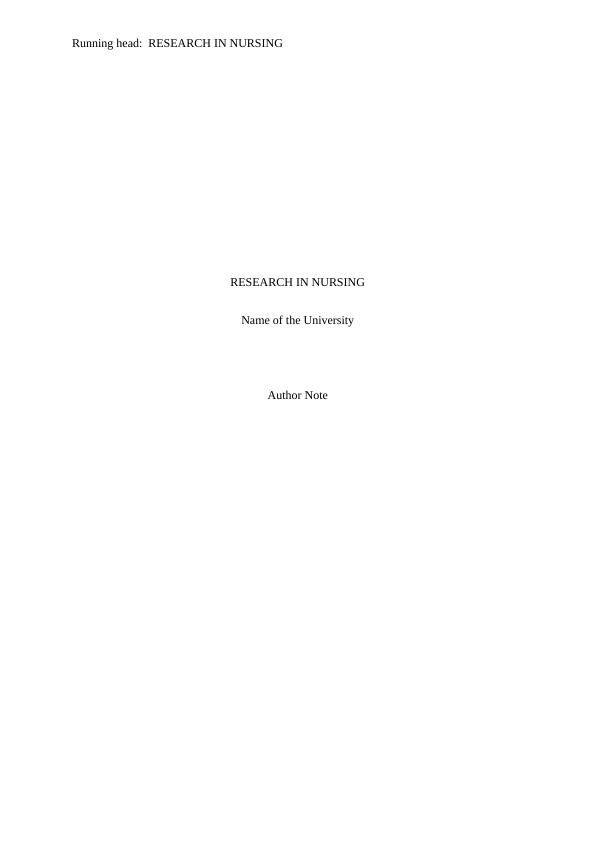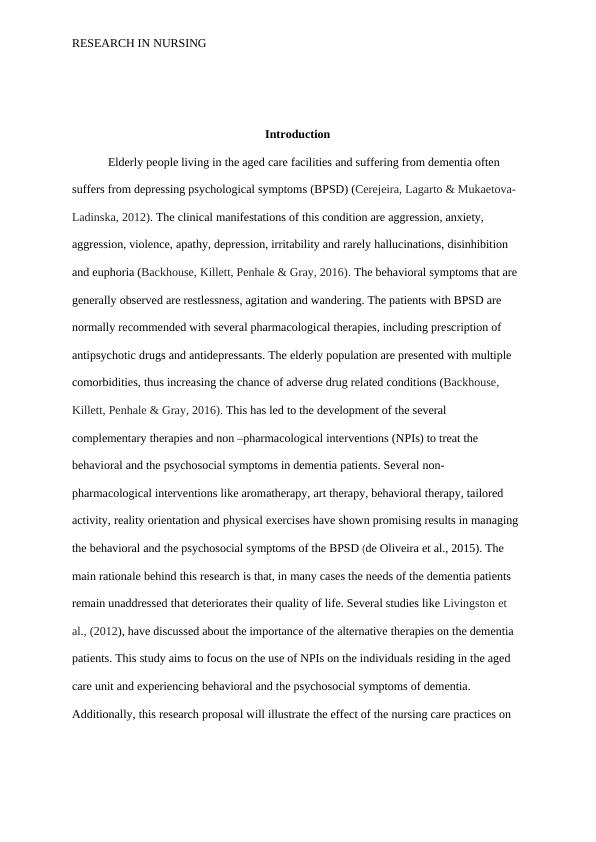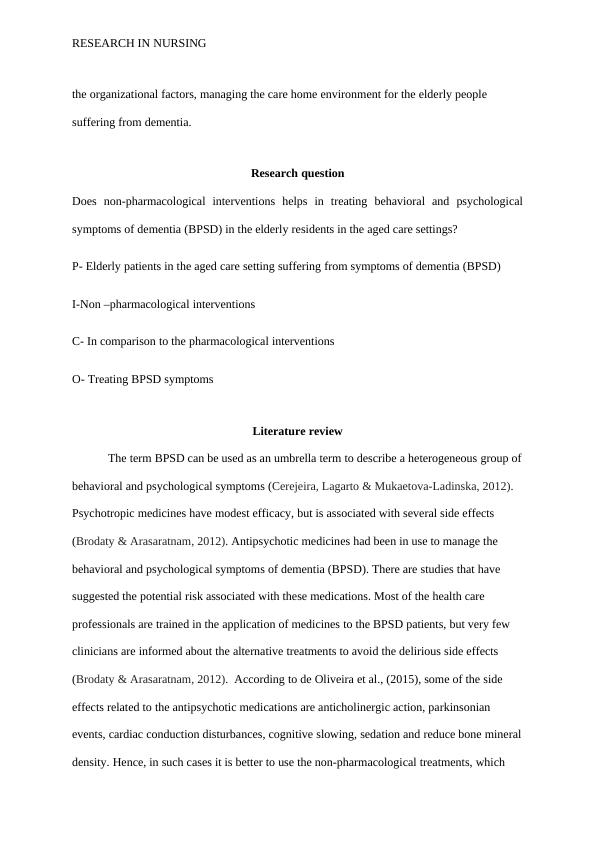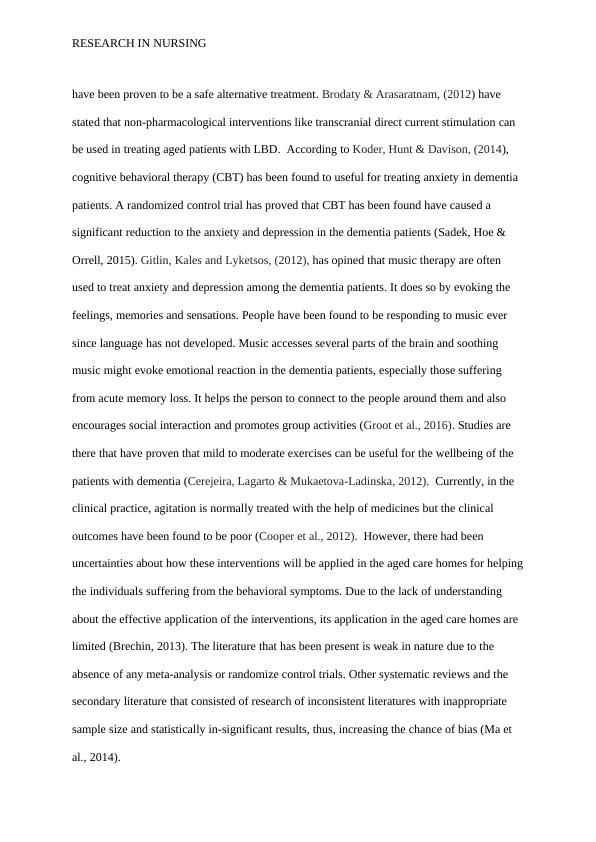Research in Nursing - Assignment PDF
12 Pages3330 Words72 Views
Added on 2021-09-17
Research in Nursing - Assignment PDF
Added on 2021-09-17
ShareRelated Documents
Running head: RESEARCH IN NURSING
RESEARCH IN NURSING
Name of the University
Author Note
RESEARCH IN NURSING
Name of the University
Author Note

RESEARCH IN NURSING
Introduction
Elderly people living in the aged care facilities and suffering from dementia often
suffers from depressing psychological symptoms (BPSD) (Cerejeira, Lagarto & Mukaetova-
Ladinska, 2012). The clinical manifestations of this condition are aggression, anxiety,
aggression, violence, apathy, depression, irritability and rarely hallucinations, disinhibition
and euphoria (Backhouse, Killett, Penhale & Gray, 2016). The behavioral symptoms that are
generally observed are restlessness, agitation and wandering. The patients with BPSD are
normally recommended with several pharmacological therapies, including prescription of
antipsychotic drugs and antidepressants. The elderly population are presented with multiple
comorbidities, thus increasing the chance of adverse drug related conditions (Backhouse,
Killett, Penhale & Gray, 2016). This has led to the development of the several
complementary therapies and non –pharmacological interventions (NPIs) to treat the
behavioral and the psychosocial symptoms in dementia patients. Several non-
pharmacological interventions like aromatherapy, art therapy, behavioral therapy, tailored
activity, reality orientation and physical exercises have shown promising results in managing
the behavioral and the psychosocial symptoms of the BPSD (de Oliveira et al., 2015). The
main rationale behind this research is that, in many cases the needs of the dementia patients
remain unaddressed that deteriorates their quality of life. Several studies like Livingston et
al., (2012), have discussed about the importance of the alternative therapies on the dementia
patients. This study aims to focus on the use of NPIs on the individuals residing in the aged
care unit and experiencing behavioral and the psychosocial symptoms of dementia.
Additionally, this research proposal will illustrate the effect of the nursing care practices on
Introduction
Elderly people living in the aged care facilities and suffering from dementia often
suffers from depressing psychological symptoms (BPSD) (Cerejeira, Lagarto & Mukaetova-
Ladinska, 2012). The clinical manifestations of this condition are aggression, anxiety,
aggression, violence, apathy, depression, irritability and rarely hallucinations, disinhibition
and euphoria (Backhouse, Killett, Penhale & Gray, 2016). The behavioral symptoms that are
generally observed are restlessness, agitation and wandering. The patients with BPSD are
normally recommended with several pharmacological therapies, including prescription of
antipsychotic drugs and antidepressants. The elderly population are presented with multiple
comorbidities, thus increasing the chance of adverse drug related conditions (Backhouse,
Killett, Penhale & Gray, 2016). This has led to the development of the several
complementary therapies and non –pharmacological interventions (NPIs) to treat the
behavioral and the psychosocial symptoms in dementia patients. Several non-
pharmacological interventions like aromatherapy, art therapy, behavioral therapy, tailored
activity, reality orientation and physical exercises have shown promising results in managing
the behavioral and the psychosocial symptoms of the BPSD (de Oliveira et al., 2015). The
main rationale behind this research is that, in many cases the needs of the dementia patients
remain unaddressed that deteriorates their quality of life. Several studies like Livingston et
al., (2012), have discussed about the importance of the alternative therapies on the dementia
patients. This study aims to focus on the use of NPIs on the individuals residing in the aged
care unit and experiencing behavioral and the psychosocial symptoms of dementia.
Additionally, this research proposal will illustrate the effect of the nursing care practices on

RESEARCH IN NURSING
the organizational factors, managing the care home environment for the elderly people
suffering from dementia.
Research question
Does non-pharmacological interventions helps in treating behavioral and psychological
symptoms of dementia (BPSD) in the elderly residents in the aged care settings?
P- Elderly patients in the aged care setting suffering from symptoms of dementia (BPSD)
I-Non –pharmacological interventions
C- In comparison to the pharmacological interventions
O- Treating BPSD symptoms
Literature review
The term BPSD can be used as an umbrella term to describe a heterogeneous group of
behavioral and psychological symptoms (Cerejeira, Lagarto & Mukaetova-Ladinska, 2012).
Psychotropic medicines have modest efficacy, but is associated with several side effects
(Brodaty & Arasaratnam, 2012). Antipsychotic medicines had been in use to manage the
behavioral and psychological symptoms of dementia (BPSD). There are studies that have
suggested the potential risk associated with these medications. Most of the health care
professionals are trained in the application of medicines to the BPSD patients, but very few
clinicians are informed about the alternative treatments to avoid the delirious side effects
(Brodaty & Arasaratnam, 2012). According to de Oliveira et al., (2015), some of the side
effects related to the antipsychotic medications are anticholinergic action, parkinsonian
events, cardiac conduction disturbances, cognitive slowing, sedation and reduce bone mineral
density. Hence, in such cases it is better to use the non-pharmacological treatments, which
the organizational factors, managing the care home environment for the elderly people
suffering from dementia.
Research question
Does non-pharmacological interventions helps in treating behavioral and psychological
symptoms of dementia (BPSD) in the elderly residents in the aged care settings?
P- Elderly patients in the aged care setting suffering from symptoms of dementia (BPSD)
I-Non –pharmacological interventions
C- In comparison to the pharmacological interventions
O- Treating BPSD symptoms
Literature review
The term BPSD can be used as an umbrella term to describe a heterogeneous group of
behavioral and psychological symptoms (Cerejeira, Lagarto & Mukaetova-Ladinska, 2012).
Psychotropic medicines have modest efficacy, but is associated with several side effects
(Brodaty & Arasaratnam, 2012). Antipsychotic medicines had been in use to manage the
behavioral and psychological symptoms of dementia (BPSD). There are studies that have
suggested the potential risk associated with these medications. Most of the health care
professionals are trained in the application of medicines to the BPSD patients, but very few
clinicians are informed about the alternative treatments to avoid the delirious side effects
(Brodaty & Arasaratnam, 2012). According to de Oliveira et al., (2015), some of the side
effects related to the antipsychotic medications are anticholinergic action, parkinsonian
events, cardiac conduction disturbances, cognitive slowing, sedation and reduce bone mineral
density. Hence, in such cases it is better to use the non-pharmacological treatments, which

RESEARCH IN NURSING
have been proven to be a safe alternative treatment. Brodaty & Arasaratnam, (2012) have
stated that non-pharmacological interventions like transcranial direct current stimulation can
be used in treating aged patients with LBD. According to Koder, Hunt & Davison, (2014),
cognitive behavioral therapy (CBT) has been found to useful for treating anxiety in dementia
patients. A randomized control trial has proved that CBT has been found have caused a
significant reduction to the anxiety and depression in the dementia patients (Sadek, Hoe &
Orrell, 2015). Gitlin, Kales and Lyketsos, (2012), has opined that music therapy are often
used to treat anxiety and depression among the dementia patients. It does so by evoking the
feelings, memories and sensations. People have been found to be responding to music ever
since language has not developed. Music accesses several parts of the brain and soothing
music might evoke emotional reaction in the dementia patients, especially those suffering
from acute memory loss. It helps the person to connect to the people around them and also
encourages social interaction and promotes group activities (Groot et al., 2016). Studies are
there that have proven that mild to moderate exercises can be useful for the wellbeing of the
patients with dementia (Cerejeira, Lagarto & Mukaetova-Ladinska, 2012). Currently, in the
clinical practice, agitation is normally treated with the help of medicines but the clinical
outcomes have been found to be poor (Cooper et al., 2012). However, there had been
uncertainties about how these interventions will be applied in the aged care homes for helping
the individuals suffering from the behavioral symptoms. Due to the lack of understanding
about the effective application of the interventions, its application in the aged care homes are
limited (Brechin, 2013). The literature that has been present is weak in nature due to the
absence of any meta-analysis or randomize control trials. Other systematic reviews and the
secondary literature that consisted of research of inconsistent literatures with inappropriate
sample size and statistically in-significant results, thus, increasing the chance of bias (Ma et
al., 2014).
have been proven to be a safe alternative treatment. Brodaty & Arasaratnam, (2012) have
stated that non-pharmacological interventions like transcranial direct current stimulation can
be used in treating aged patients with LBD. According to Koder, Hunt & Davison, (2014),
cognitive behavioral therapy (CBT) has been found to useful for treating anxiety in dementia
patients. A randomized control trial has proved that CBT has been found have caused a
significant reduction to the anxiety and depression in the dementia patients (Sadek, Hoe &
Orrell, 2015). Gitlin, Kales and Lyketsos, (2012), has opined that music therapy are often
used to treat anxiety and depression among the dementia patients. It does so by evoking the
feelings, memories and sensations. People have been found to be responding to music ever
since language has not developed. Music accesses several parts of the brain and soothing
music might evoke emotional reaction in the dementia patients, especially those suffering
from acute memory loss. It helps the person to connect to the people around them and also
encourages social interaction and promotes group activities (Groot et al., 2016). Studies are
there that have proven that mild to moderate exercises can be useful for the wellbeing of the
patients with dementia (Cerejeira, Lagarto & Mukaetova-Ladinska, 2012). Currently, in the
clinical practice, agitation is normally treated with the help of medicines but the clinical
outcomes have been found to be poor (Cooper et al., 2012). However, there had been
uncertainties about how these interventions will be applied in the aged care homes for helping
the individuals suffering from the behavioral symptoms. Due to the lack of understanding
about the effective application of the interventions, its application in the aged care homes are
limited (Brechin, 2013). The literature that has been present is weak in nature due to the
absence of any meta-analysis or randomize control trials. Other systematic reviews and the
secondary literature that consisted of research of inconsistent literatures with inappropriate
sample size and statistically in-significant results, thus, increasing the chance of bias (Ma et
al., 2014).

End of preview
Want to access all the pages? Upload your documents or become a member.
Related Documents
Non-Pharmacological Interventions for Dementia Behaviours in Care Homeslg...
|8
|1884
|207
Effectiveness of Cognitive Behavioral Therapy in Treating Depression in Older Patients with Dementialg...
|16
|3671
|490
Complex mental Health and Recovery Assignment PDFlg...
|11
|2120
|113
Nursing leadership assignment samplelg...
|5
|801
|55
The impact of music therapy on wellbeing of dementia patientslg...
|12
|2931
|182
Comparing the effectiveness of non-pharmacological and pharmacological interventions for Schizophrenia in UK: systematic reviewlg...
|5
|981
|217
